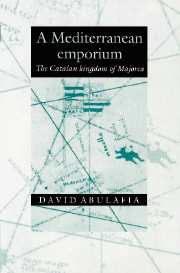Book contents
- Frontmatter
- Contents
- Preface
- Note on nomenclature
- List of the kings of Majorca, 1229–1343
- Note on the coinage of the kingdom of Majorca
- Map 1 The kingdom of Majorca
- Map 2 The western Mediterranean
- PART I UNITY AND DIVERSITY
- 1 The Balearic setting
- 2 The kingdom and its historians
- 3 The constitutional problem
- 4 One kingdom, three religions: the Muslims
- 5 One kingdom, three religions: the Jews
- PART II THE CROSSROADS OF THE MEDITERRANEAN
- Conclusion
- Appendices
- Bibliography
- Index
4 - One kingdom, three religions: the Muslims
Published online by Cambridge University Press: 05 October 2010
- Frontmatter
- Contents
- Preface
- Note on nomenclature
- List of the kings of Majorca, 1229–1343
- Note on the coinage of the kingdom of Majorca
- Map 1 The kingdom of Majorca
- Map 2 The western Mediterranean
- PART I UNITY AND DIVERSITY
- 1 The Balearic setting
- 2 The kingdom and its historians
- 3 The constitutional problem
- 4 One kingdom, three religions: the Muslims
- 5 One kingdom, three religions: the Jews
- PART II THE CROSSROADS OF THE MEDITERRANEAN
- Conclusion
- Appendices
- Bibliography
- Index
Summary
The kingdom of Mallorca provides a useful laboratory in which to examine the breakdown of the convivencia of Jews, Christians and Muslims in the late Middle Ages. However, the focus of such a study has to be the island parts of the kingdom, particularly Mallorca, where the Jewish community is especially well documented, and Menorca, where the destruction of the Muslim community is the dominating theme. Although even Montpellier may have possessed a small Muslim population at some time, the Muslim inhabitants of this kingdom were concentrated in the Balearics; Jews lived in all parts of the kingdom, though they suffered expulsion from Montpellier when the French king cleared his lands of Jews in 1306. The Jewish population of Mallorca has attracted considerable attention from historians interested in its survival as a coherent converso community, the Chuetas or Xuetes, subject to discrimination more or less until the twentieth century; some interest has also been expressed in its achievements in cartography and astronomy, notably under King Peter IV of Aragon, who acquired Mallorca in 1343. Perpignan was also a centre of Jewish astronomy and science; the Jews of Roussillon have been the subject of a now classic study of their moneylending activities by R. W. Emery. However, the earlier history of the Jews and the Muslims in the Majorcan lands is still the subject of much controversy. The aim here is as much to make clear some areas of disagreement as to resolve them.
- Type
- Chapter
- Information
- A Mediterranean EmporiumThe Catalan Kingdom of Majorca, pp. 56 - 74Publisher: Cambridge University PressPrint publication year: 1994



